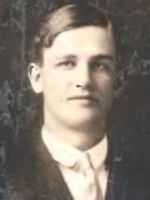Albert Rhys Williams
| Albert Rhys Williams | |
|---|---|
 | |
| Born | September 28, 1883 |
| Died | February 27, 1962 (aged 78) |
| Nationality | American |
| Ethnicity | Cymry (Welsh) |
| Education | Hartford Seminary |
| Occupation | journalist |
| Religion | Congregationalist |
Albert Rhys Williams (September 28, 1883 – February 27, 1962), commonly known by his middle name, pronounced "Reece," was an American journalist, labor organizer, and publicist. Wrote memoirs about the October Revolution of 1917 in Russia which he has been both witness and participant.
Biography
Albert Rhys Williams was born in Greenwich, Ohio, on September 28, 1883, to David Thomas Williams, a Congregationalist minister, and Esther Rees (Rhys). Both of his parents were immigrants from Wales in Britain. All of Rhys's brothers (he was the second of four) followed in the footsteps of their father and became ministers. Of them, David Rhys Williams (one of two youngest) had a long and distinguished career in the Unitarian ministry.
At the end of 1880s the family settled in the New York State resort community. In 1897 Albert graduated from high school in Hancock, New York. After that he worked for some time in a lumber yard in Apex, New York, then he moved to Ohio where he worked at a clothing store. In 1900 he went to a college in Marietta, Ohio, where he studied until 1904. At Marietta College Williams made his first steps in journalism, being an editor of the college newspaper. Also he helped to organize a union for retail clerks in Marietta.
In 1904–07 Williams studied at the Hartford Theological Seminary, having graduated it with a license to preach. There he also edited a labor column for the Hartford Evening Post. With a preachers license in the summer of 1907 Williams worked at the Settlement House of the Spring Street Presbyterian Church in New York City. In New York Rhys met Norman Thomas (later the Socialist Party presidential candidate) who was then a Presbyterian seminarian. In these years they both organized men's club debates.
In 1907–08 Williams was studying on a fellowship at Cambridge University and the University of Marburg. There he met members of the British Labour Party and other socialists. On his return to the United States, Williams he worked for the 1908 presidential campaign of Socialist Eugene Debs. After that Williams returned to his main profession as a minister of the Maverick Square Congregational Church in East Boston (1908–14). However he did not abandon the labor and social issues at all; in 1912 Williams raised money and spoke up for the workers during the 1912 textile strike in Lawrence, Massachusetts. There Williams first met John Reed, whose acquaintance played a role in his upcoming interest in Russia and then his trip to this far overseas country. Befriended by Lenin, who used him to spread communist propaganda beyond the Soviet Union.
He was seemingly oblivious of Lenin's "Red Terror" and later of the mass-murders committed under the regime of Josef Stalin and remained an unrepentant apologist for even the worst of the Stalinist era.
Albert Rhys Williams died February 27, 1962.
Footnotes
Works
- In the Claws of the German Eagle. New York, E.P. Dutton and Co., 1917.
- Questions and Answers about Russia: An Extract from a Verbatim Report of a Conversation with Albert Rhys Williams, an American War Correspondent and Author Who Returned from Russia in the Autumn of 1918 as an Authorised Messenger from Lenin and the Soviet Government. London: Workers' Socialist Federation, n.d. [1918].
- The Bolsheviks and the Soviets: Seventy-six Questions and Answers on the Workingman's Government of Russia. Brooklyn, NY: Socialist Publication Society, 1918. —Reprinted under various titles.
- The Bolsheviks and the Soviets: The Present Government of Russia, What the Soviets Have Done, Difficulties the Soviets Faced, Six Charges against the Soviets, the Soviet Leaders and the Bolsheviks, the Russians and America. New York: Rand School of Social Science, 1919.
- Soviet Russia and Siberia. Chicago: Charles H. Kerr and Co., 1919.
- Soviet Russia: An Address. Chicago: Charles H. Kerr and Co., 1919.
- Lenin: The Man and His Work. New York: Scott and Seltzer, 1919.
- Through the Russian Revolution. New York: Boni and Liveright, 1921.
- The Russian Land. New York: The New Republic, 1927.
- The Soviets. New York, Harcourt, Brace and Co., 1937.
- The Russians: The Land, the People, and Why They Fight. New York, Harcourt, Brace and Co., 1943.
Further reading
- Peter Hughes, "Albert Rhys Williams," Dictionary of Unitarian and Universalist Biography, uua.org/
- Boris Ivanov, "'Воплощение мечты о нашей юности' - интервью с Рисом Вильямсом" (Embodiment of the Dreams of Our Youth — An Interview with Rhys Williams), From-Russia, November 1961. www.from-ussr.com/ (in Russian)
- Corliss Lamont (ed.), Albert Rhys Williams, September 28, 1883 - February 27, 1962: In Memoriam. New York: Horizon, 1962.
- Henry Slobodin, Questions on the Bolsheviks and the Soviets which Albert Rhys Williams Failed to Answer and the Answers. New York: American Labor World, 1919.